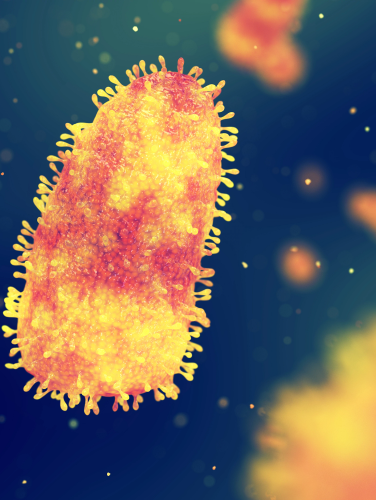
Rabies/Zoonosis: What You Need to Know
Zoonotic diseases are caused by harmful germs like viruses, bacterial, parasites, and fungi that spread from animal to human.
Rabies/Zoonosis Control investigates animal-inflicted injuries to humans and/or their pets (e.g., bites, scratches), Provide consultative services to the public and medical community regarding zoonotic diseases and rabies exposures. Works closely with Animal Care and Control of Charlotte, Huntersville, Cornelius, and Matthews.
If you are bitten or scratched by an animal...
- Immediately wash the area with soap and water, and consult your physician.
- A tetanus booster is recommended if you have not had one in the last 5 yrs.
- If the animal you had an incident with dies/killed, do not throw it in the trash. Call 311 to have it picked up by Animal Control.
- Fill out the Animal Bite and Scratch Referral Form and submit it to [email protected] or Fax to (704)423-9400
If an animal attacks your pet...
- Put on gloves before touching your pet
- Isolate your pet from your other pets &/or small children
- Contact your veterinarian to get a rabies booster ASAP
- Contact Animal Care and Control (311) and Health Department
- If your pet has tooth puncture marks after being outside alone, immediately contact your veterinarian and give rabies booster immediately.
Protect Yourself From Rabies
Rabies is a deadly viral disease affecting the central nervous system. Rabies can be prevented but not cured. A healthy animal or human can get rabies when bitten, licked or scratched by a sick animal. The virus lives in the saliva and nervous tissue. You can get rabies if animal saliva gets into a cut, scratch or mucous membrane.
Here are some precautions to prevent the transmission of rabies:
It is the LAW to have your pets up-to-date on their rabies vaccinations. Dogs, cats and ferrets are required to have a current rabies vaccination.
Unvaccinated puppies & kittens should not be left outdoors without supervision.
Obey leash laws and keep your pets restrained.
Report stray animals to Animal Care and Control (311)
Teach your children to stay away from animals they do not know including wild animals. A rabid wild animal may act tame.
If you observe a raccoon or other animal acting sick or abnormal (e.g., raccoon active at 11am) - Contact Animal Care and Control (311).
Feed your pets indoors. Do not toss table scraps into your yard. Do not leave pet food outside for any length of time.
Keep your property free of exposed garbage, pet food, and bird feed. If trash must be stored outside at night, put it in sturdy tightly closed containers.
Keep your home in good repair to prevent animals from entering through cracks and crevices. Use strong metal mesh to cover potential entryways such as chimneys, dryer vents, and holes in eaves.
Do not touch an injured animal - Contact Animal Care and Control (311).
Stay away from animal traps and storm drains. Raccoons travel through storm drains.
Rabies Vaccinations for Humans
Rabies Vaccinations Post-Exposure Prophylaxius (PEP)
Steps to take if you are getting Post-Exposure Rabies Vaccinations:
Post-exposure (Def.): Getting vaccinations AFTER being bitten by a rabid animal
Rabies vaccines are only available at major ERs. Prior to going to an ER, contact your insurance provider, if applicable, to notify them of your upcoming ER visit. Additionally, make sure to go to an ER that is within your network.
What to Expect. During your initial ER visit they will give the biological called Rabies Immune Globulin (HRIG). This biological provides immediate protection against the rabies virus. In addition to the HRIG, they will administer the first (out of 4) rabies vaccine in the arm. The medical facility will schedule and/or refer you to receive the rest of the rabies vaccine series for Day 3, Day 7, and Day 14.
If you are immuno-compromised, the rabies vaccine should be given in the arm on five different days (Day 0, 3, 7, 14, and 28), followed by a blood test in 1-2 weeks. The name of the blood test is Rabies Neutralizing Antibody Titration (REFIT).
You had PEP in the past? If you have received the rabies post-exposure series in the past, you need two rabies booster vaccines (no HRIG).
The Mecklenburg County Health Department does NOT provide post-exposure rabies vaccinations.
Pre-Exposure Rabies Vaccines
Who? Veterinarians, Veterinary Staff, & Animal Control Officers
How? Schedule an appointment with MCHD appointment line 704.336.6500
The Mecklenburg County Health Department does NOT cover cost for pre-exposure rabies vaccinations
When you find a bat in your residence...
Don’t panic. NEVER TOUCH A BAT OR ANY OTHER WILD ANIMAL!
You cannot get rabies from just seeing a bat or being in a room or hallway with one.
A bat that is being handled might bite in self-defense. A bat that you can approach – one that cannot fly, is on the floor or clinging to a wall – is much more likely than other bats to be sick or injured and might have rabies. Either way, NEVER touch a bat.
If you see a bat in your home, do not approach it or touch it. Don’t pet it, catch it, comfort it, kick it aside or try to shoo it away. Stay back and call 311 in order to place a report to Animal Care and Control.
If you are bitten or come in direct contact with a bat, don’t wait: Immediately get medical attention through your local emergency room. A doctor’s treatment after a bite is simple and effective.
Remember: Bat exposures may be difficult to recognize, and should be carefully assessed and explained to those who may be affected because bats have tiny, sharp teeth that inflict limited injury, so a bite may not be evident. The bat may have been found in a room or in close vicinity to someone who may have been sleeping or napping. In this situation, rabies PEP should be initiated promptly for all persons who were potentially exposed.

